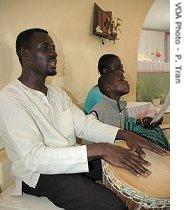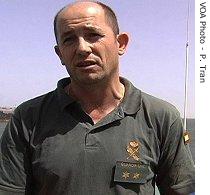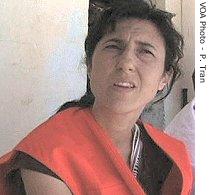-
(单词翻译:双击或拖选)
Nouadhibou, Mauritania
22 August 2007
Every week, hundreds of Africans set out from various ports in often decaying fishing boats in order to slip away from their home countries and chase jobs and dreams of life outside Africa. The outward flow of these West Africans has fueled a service industry of workers who supply the needs of would be migrants. For VOA, correspondent Phuong Tran has more from Nouadhibou, Mauritania about people who work with them before, during and after their sea crossing attempts.
Almost all the churchgoers in the town's only Catholic church are immigrants from around West Africa.
Nouadhibou is one of the closest ports to the Spanish Canary Islands, a popular destination for West Africa's Europe-bound migrants.
 |
| Father Jerome Dukiya, Nouadhibou |
"Some of them ask for prayers," he said. "They come, 'bless me father, I know what I am doing is wrong, but I have go to.' They need my blessing1. You cannot refuse to pray for somebody. I know that they may die and you cannot do anything to stop them. It is difficult and painful to live with."
Dukiya works with the Catholic non-profit Caritas providing small business loans and training to try and convince would-be migrants to stay.
Dukiya says few do.
Other non-profits train returned migrants to such skills as cutting hair, dyeing fabrics2, or sewing. But many say the migrants disappear after coming to classes a few times.
Facely is a 21-year-old Guinean who has tried to leave twice before. He says the boat organizer told him if he can find four clients willing to pay 1,000 euros each for a spot on the boat, Facely can go for free.
U.N. crime officials say it is mostly international members of organized crime who buy the boats, using people like Facely to recruit passengers.
Facely sits for hours in this restaurant shack3 run by Guineans, hoping to hear of someone looking for an open spot on a boat.
While Facely helps people find a way to leave Nouadhibou, a Spanish National Guard commander goes to sea. Spain has provided Mauritania a surveillance boat, guards and a night-radar equipped plane since signing an agreement last year to prevent clandestine4 migration5.
 |
| Paco Corrales |
He says Mauritania has been a harder assignment because of the rougher waters, and the numbers trying to leave in poorly constructed canoes.
The commander says his crew rarely sleeps because they are constantly on surveillance or carrying out a rescue. He says he gets information from informants when some canoes leave. Corrales says they find others during routine surveillance trips at sea.
According to local police, some 5,300 West Africans were caught at sea near Nouadhibou last year.
Once returned to Nouadhibou, the Africans are held in this detention6 center for up to three days before they are returned to their home countries, or rarely, given refugee status to relocate.
The Spanish Red Cross provides the mostly male detainees three meals a day, health care, a blanket and a five-minute phone call to let someone know they are alive.
 |
| Conchi Delanieva |
She says it is everyone's right to search for a better life, that it is a human need to find relief from pain.
Border officials in Spain and Italy, major destinations for West Africa's illegal migrants, say about 12,000 have reached their shores so far this year.
Officials are not clear how many die during the crossing.
European officials have reinforced water patrols in the triangle formed by Mauritania, the Cape7 Verde Islands and Senegal, forcing migrant departures further south to the unguarded creeks8 and islets of Gambia, Guinea-Bissau and Guinea.
 收听单词发音
收听单词发音
1
blessing

|
|
| n.祈神赐福;祷告;祝福,祝愿 | |
参考例句: |
|
|
|
2
fabrics

|
|
| 织物( fabric的名词复数 ); 布; 构造; (建筑物的)结构(如墙、地面、屋顶):质地 | |
参考例句: |
|
|
|
3
shack

|
|
| adj.简陋的小屋,窝棚 | |
参考例句: |
|
|
|
4
clandestine

|
|
| adj.秘密的,暗中从事的 | |
参考例句: |
|
|
|
5
migration

|
|
| n.迁移,移居,(鸟类等的)迁徙 | |
参考例句: |
|
|
|
6
detention

|
|
| n.滞留,停留;拘留,扣留;(教育)留下 | |
参考例句: |
|
|
|
7
cape

|
|
| n.海角,岬;披肩,短披风 | |
参考例句: |
|
|
|
8
creeks

|
|
| n.小湾( creek的名词复数 );小港;小河;小溪 | |
参考例句: |
|
|
|















